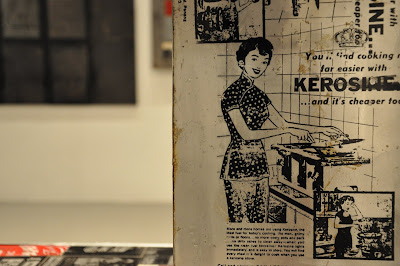Writing Power | Zulkifli Yusoff

Pelayaran Munsyi Abdullah [detail], 2003, Aliya and Farouk Khan Collection. [Gallery Impression, Writing Power | Zulkifli Yusoff, NUS Museum, 2011]
Date: 9 September – 4 December 2011
(Exhibition extended until 19 Feb 2012)
(Exhibition extended until 19 Feb 2012)
Venue: NX Gallery, NUS Museum
Assembling two installations Malaysian artist Zulkifli Yusoff completed almost two decades apart, Writing Power (re)stages and simultaneously unpacks the conceptual grounds and the workings that inform the artist’s practice. Once restated as a contemporary encounter, colonial and native texts – often lodged as literary or historical – offer fresh lines of enquiry, contextual re-positionings, anecdotal links, and re-significations purposeful beyond the articulation of artistic methods, projecting into the dynamic role of reading and its potentials. Writing Power enacts a matrix that prospects engagements between image, texts and ideas and the associated authorial positions, negotiations that implicate the viewer’s interpretative agency. An assemblage of sites exposing everyday work materials ranging from archival traces to testimonials to media prints which make visualizations possible, they form traces that are recalcitrant, fragmentary rather than fungible, calling out: if it matters not-knowing what these traces mean, who made them, when and why, where do we place them, or how to approach them, in the now.
Entering into the Malaysian contemporary art scene in the late 1980s, Zulkifli Yusoff’s practice looks at how historical texts color cultural memory and shape contemporary understandings of the Self. Often arranging materials in an assemblage of citation and juxtaposition, and presenting them as archival scaffolds, a complex of texts and objects, Writing Power draws on three texts which were mobilized by Zulkifli Yusoff for his installations since the 1990s. Namely, The Story of Abdullah’s Voyage to Kelantan (Pengajian Kesah Pelayaran Abdullah Munshi, c. 1838) which remains a crucial reference for the study of modern Malay literature, the Malay Annals (Sejarah Melayu, c. 16th century) which locates the genealogy of the Malay Sultanates of the Malaccan Empire, and the Malay Sketches (c. 1895) penned by the first Resident General of the Federated Malay States, Sir Frank Swettenham, which provides glimpses into his interactions with and regard for the communities of the region.


Comments
Post a Comment